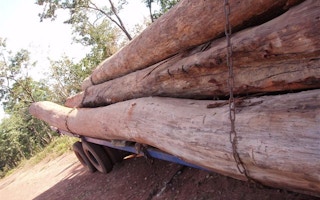A leaked report by an international environmental group revealing huge increases in illegal logging in Laos with an implication of government collusion has prompted officials in the small Southeast Asian nation to take action to examine discrepancies in timber export and import figures with China and Vietnam.
The report by the World Wide Fund for Nature (WWF) found that the value of Lao wood product imports reported by China and Vietnam exceeded that of Lao exports more than 10-fold, based on an analysis of Lao customs data. It appeared briefly on the web more than a week ago, but was removed at the international environmental group’s request.
Laos exported 1.4 million cubic meters (49.4 million cubic feet) of timber to these two countries in 2013 — more than 10 times its official reported timber harvest, providing evidence of illegal logging on a significantly increased scale.
Last year, China and Vietnam accounted for 96 per cent of the US $1.7 billion total value of Lao wood exports, the majority of which were illegal, the report said.
Officials are discussing why the Lao export figures do not match those of the corresponding Vietnamese imports, Khaphout Ratthanamany, director of Forest Inspection Department at Lao’s Ministry of Agriculture and Forestry, told RFA’s Lao service on Friday.
Laos had indicated that it exported 200,000-300,000 cubic meters (7.06 million-10.6 million cubic feet) of timber to Vietnam last year, while Vietnam said it imported more than one million cubic meters (35.3 million cubic feet), he said.
The figures for Lao timber exported to Vietnam do not match the information for wood imported into Vietnam because the information comes from various sources, he said.
“We are surprised by the statistics, and it is a good sign that we have to do more research,” Khaphout Ratthanamany said.
Lao officials are now investigating the timber shipments according to the government’s announcement No. 1360, although some of the timber and related documentation is not in order because they were issued the before the announcement, he said.
The Lao government decree issued on Aug 8 prohibits the export of logs and mandates that timber must be processed in Laos before it is exported to foreign countries.
Previously, the government had banned the export of logs but exceptions were allowed only when it approved them.
“We are researching the information to learn the steps from the logging of the timber to the management of exports,” he said. “In doing so, we need to collect export statistics from each border checkpoint and see if they match with the statistics from the import-and-export department.”
Regarding the forest area not included in the government data, Lao officials are working with their Vietnamese counterparts and hold an annual meeting to identify work points in their cooperation, he said.
Massive and systematic corruption
The report, which came about from a project agreement with the Lao Ministry of Agriculture and Forestry, cited massive and systematic corruption and poor governance of logging activities in the country’s four southernmost provinces from November 2012 to May 2015.
It focuses on conversion forestry — logging in areas marked for the development of infrastructure projects such as hydropower dams, road building and mining operations — used as an excuse for large-scale logging that otherwise would not be permitted under Lao law.
The government issues logging quota exceptions in areas where infrastructure construction projects, such as dams, roads and national grids, are being built, Khaphout Ratthanamany said.
Lee Poston, WWF-Greater Mekong communications director, told RFA on Friday that the report was still a draft that was undergoing a review process with stakeholders and not ready to be formally published.
“It does address a wide variety of important issues related to illegal logging in Laos and trade with other countries, so we need to ensure that it is thoroughly reviewed by all stakeholders before it is final and ready to be officially published and commented on,” he wrote in an email.
The report, marked as a “final draft for internal use only,” was written by Dennis Smirnov, timber trade manager of a WWF project called CarBi, which was funded by Germany’s International Climate Initiative of the Federal Ministry for the Environment, Nature Conservation and Nuclear Safety and the WWF Germany.
Copyright © 1998-2014, RFA. Used with the permission of Radio Free Asia, 2025 M St. NW, Suite 300, Washington DC 20036.

















